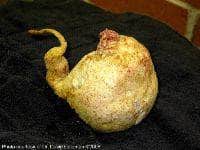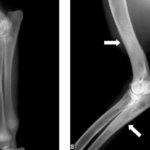If swallowed in liquid form, some polyurethane-based glue products can create a life-threatening stomach blockage because they expand and harden once in the stomach. Glues that contain diphenylmethane diisocyanate (MDI), (e.g. Gorilla Glue and Elmer’s Glue-All Max) are designed to foam and expand after exposure to moisture. These types of glue are most typically used by woodworkers.
Unfortunately, if a pet swallows glue with MDI in it, the warm and moist environment of the stomach causes the glue to foam and expand into a large mass. The glue is thought to harden within a few minutes after ingestion, effectively becoming a foreign body and blocking the entry of food either in or out of the stomach. When a large amount is ingested, it hardens in the shape of the stomach. The hardened material usually can’t be vomited up because it’s too big to go through the esophagus.


While other animals have been known to eat these glues, the typical patient is a dog. Even if you see your pet swallow the glue, do not force him to vomit because this could cause the expanding glue to get stuck in the esophagus or be inhaled into the lungs. Surgically speaking, it is more difficult to remove the glue from the esophagus than from the stomach.
Signs that a pet has eaten this glue can be seen anywhere from 15 minutes to 20 hours after ingestion. These signs include vomiting (sometimes it is bloody), an enlarged stomach, stomach pain, lack of appetite, and lethargy. X-rays of the abdomen are typically necessary to arrive at a diagnosis. Surgery is the only possible treatment as the foam is not digestible. Surgery is usually done on an emergency basis since stomach ulceration and rupture can occur if the glue is not removed from the stomach in a timely manner.
Ingesting a few drops of these glues may not be a problem and would likely just cause mild gastrointestinal distress. If you don’t know how much your pet ingested, then it wise to consult with your veterinarian who may recommend taking x-rays.
Because a warning isn’t always listed on the product label, consider any expanding adhesive as potentially containing it. To prevent your pets from ingesting these glues or any potentially harmful substance, store them properly and securely where there is no chance your pets could get them.


